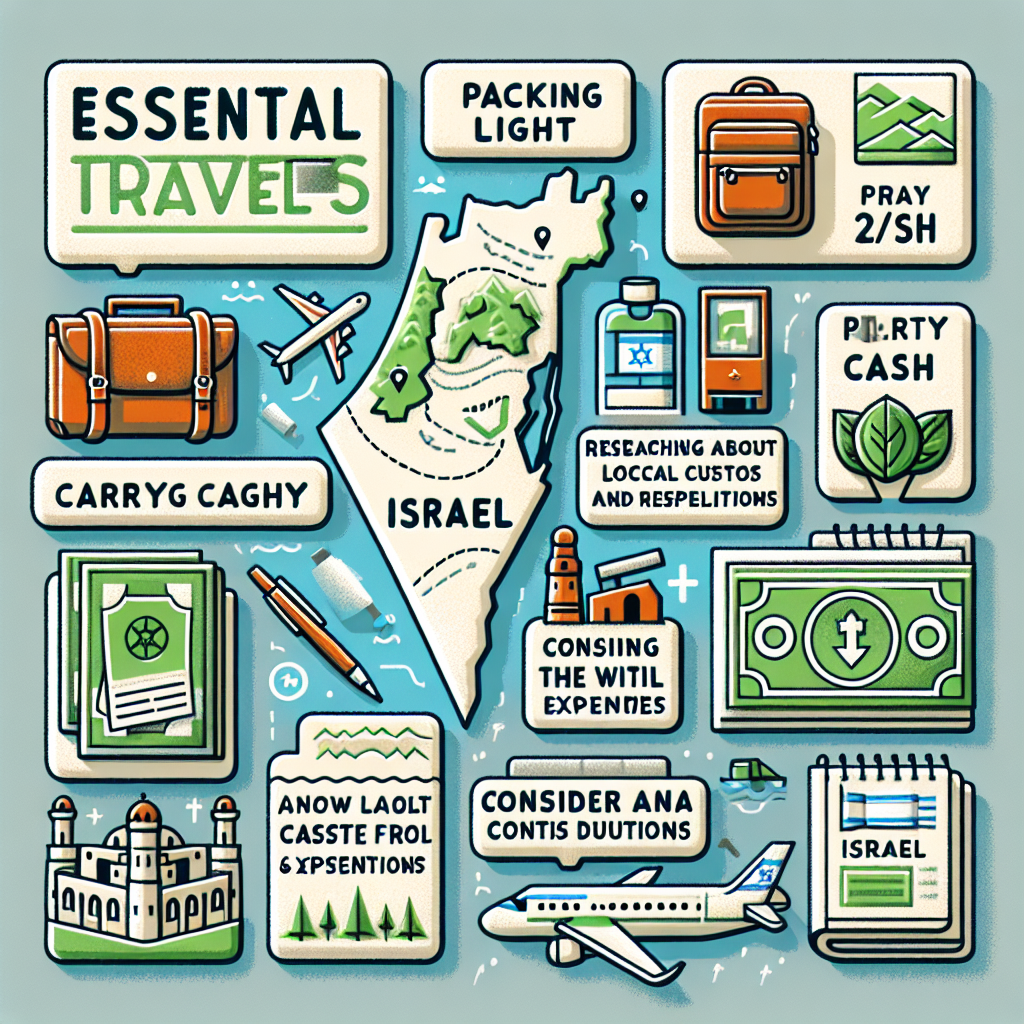“Embark with Insight: Essential Travel Tips for a Seamless Israel Adventure”
Introduction
Traveling to Israel offers a unique blend of ancient history, diverse cultures, and breathtaking landscapes. Before embarking on your journey to this historic land, it’s important to consider several essential travel tips to ensure a smooth and enjoyable experience. Understanding local customs, weather patterns, safety measures, and logistical details can greatly enhance your trip. From visiting religious sites to exploring the natural beauty of the Dead Sea and the Negev Desert, being well-prepared will allow you to fully immerse yourself in all that Israel has to offer. Whether you’re a first-time visitor or a seasoned traveler, keeping these tips in mind will help you navigate your trip with confidence and ease.
Essential Packing Checklist for Your Trip to Israel
Embarking on a journey to Israel, a land steeped in history and culture, requires thoughtful preparation to ensure a seamless and enriching experience. As you gear up for your adventure, it is crucial to consider the diverse climate, local customs, and various activities you may engage in. This essential packing checklist will guide you through selecting the right items to bring along, ensuring that you are well-equipped for your travels.
Israel’s climate is characterized by hot and dry summers, with coastal areas experiencing humidity, while winters can be cool and rainy, particularly in the north and central regions. Therefore, packing clothing that can be layered is advisable. Lightweight, breathable fabrics work well for the daytime heat, while a sweater or light jacket can be indispensable for cooler evenings or when visiting religious sites where modest attire is required. Additionally, a waterproof jacket or an umbrella is a wise addition during the winter months or if your travel plans include regions with higher precipitation.
Footwear is another critical aspect of your packing list. Comfortable walking shoes are a must, as exploring the ancient streets of Jerusalem or the ruins of Masada involves significant walking, often on uneven surfaces. If your itinerary includes the Dead Sea or the Mediterranean beaches, remember to pack sandals or water shoes, along with swimwear and a quick-dry towel.
Sun protection is paramount in Israel’s intense sunlight. A high-SPF sunscreen, a wide-brimmed hat, and sunglasses will shield you from harmful UV rays, whether you’re wandering through open-air markets or hiking in the Negev Desert. In contrast, for those venturing into the cooler Golan Heights or planning a night in the desert, warm clothing is essential to combat the temperature drop after sunset.
When it comes to technology and gadgets, a universal travel adapter is essential, as Israel uses the Type H electrical plug. A portable power bank can be a lifesaver for long days of sightseeing when access to power outlets may be limited. Additionally, consider bringing a good quality camera or smartphone to capture the memories you’ll make, but always be respectful of photography restrictions, especially in religious or military areas.
Health and safety items should not be overlooked. A basic first-aid kit, along with any personal medications, is important. It’s also recommended to pack a reusable water bottle to stay hydrated, as tap water is generally safe to drink in Israel. For peace of mind, travel insurance that covers medical emergencies and unexpected trip changes is highly recommended.
Lastly, familiarize yourself with the local currency, the New Israeli Shekel (NIS), and consider bringing a mix of cash and cards. While credit cards are widely accepted, having some cash on hand for smaller purchases or in places that do not accept cards is prudent.
In summary, preparing for your journey to Israel involves a balance of practicality and respect for the local environment and customs. By following this essential packing checklist, you can focus on immersing yourself in the rich tapestry of experiences that await, from the vibrant streets of Tel Aviv to the tranquil beauty of the Sea of Galilee. With careful planning and the right items in your luggage, your trip to Israel will be both comfortable and unforgettable.
Navigating Cultural Etiquette: Respectful Travel in Israel

Essential Travel Tips: What to Know Before Your Journey to Israel
Embarking on a journey to Israel, a land steeped in history and cultural richness, is an experience that promises to be both enlightening and memorable. To ensure that your visit is as smooth and respectful as possible, it is crucial to acquaint yourself with the local customs and etiquette that define this unique country. Israel is a tapestry of religious significance and modernity, and navigating its cultural landscape requires sensitivity and awareness.
First and foremost, understanding the religious diversity of Israel is key. The country is home to some of the most sacred sites for Judaism, Christianity, and Islam, and as such, it is a melting pot of religious practices and beliefs. When visiting holy places, such as the Western Wall in Jerusalem, the Church of the Holy Sepulchre, or the Dome of the Rock, it is important to dress modestly. For both men and women, this typically means covering shoulders and knees, and in some cases, women may be required to cover their heads as well. This show of respect is not only appreciated but often mandatory to gain entrance to these revered sites.
Moreover, the observance of Shabbat, the Jewish day of rest, which runs from Friday evening to Saturday evening, has a profound impact on public life in Israel. During this time, many businesses, including restaurants and public transportation services, may close or operate on a limited schedule. As a traveler, planning ahead for this weekly occurrence is essential. It provides a unique opportunity to witness the cultural fabric of Israel, as families gather to share meals and spend time together, free from the distractions of work and technology.
In addition to religious considerations, social interactions in Israel are characterized by a directness that might be unfamiliar to visitors. Israelis are known for their straightforward communication style, which should not be mistaken for rudeness. It is a reflection of the value placed on clear and honest dialogue. When engaging in conversation, feel free to express yourself openly, but always with respect and politeness.
Another aspect of Israeli culture to be mindful of is the security measures that are a part of daily life. Security checks are common at public buildings, shopping malls, bus and train stations, and other venues. Approach these with patience and understanding, following the instructions of security personnel without complaint. These procedures are in place for the safety of everyone and are a routine part of living in and visiting the country.
When it comes to tipping, it is customary to leave a 10-15% gratuity at restaurants if the service was satisfactory, as it is not usually included in the bill. However, tipping is less common in taxis, and drivers do not expect it, though rounding up the fare is a polite gesture.
Lastly, while Hebrew and Arabic are the official languages of Israel, English is widely spoken, particularly in tourist areas, making communication for international visitors relatively straightforward. Nevertheless, learning a few basic phrases in Hebrew can go a long way in showing respect for the local culture and can enrich your interactions with Israelis.
In conclusion, traveling to Israel is an opportunity to immerse yourself in a land of profound historical and cultural significance. By adhering to the local customs and etiquette outlined above, you will not only demonstrate respect for the traditions and people of Israel but also enhance your own travel experience, creating lasting memories of this diverse and vibrant country.
Top Safety Tips for a Hassle-Free Journey in Israel
Embarking on a journey to Israel, a land steeped in history and culture, can be an exhilarating experience. However, to ensure a hassle-free trip, it is crucial to be well-prepared and aware of the essential travel tips that can help navigate the complexities of international travel, particularly to a region as dynamic as the Middle East. Israel is a country that offers an array of experiences, from the ancient walls of Jerusalem to the vibrant nightlife of Tel Aviv, and understanding the nuances of travel safety can significantly enhance your visit.
First and foremost, it is imperative to stay informed about the current political climate. Israel’s geopolitical situation can be volatile, with occasional tensions that may affect certain areas more than others. Prior to departure, travelers should consult their government’s travel advisories and remain updated on local news throughout their stay. This proactive approach allows for informed decision-making, especially when it comes to planning excursions to sensitive regions such as the West Bank or the Gaza Strip border.
Moreover, respecting local customs and religious sensitivities is not only a matter of cultural immersion but also contributes to personal safety. Israel is a tapestry of religious traditions, and public behavior that may be acceptable in other parts of the world could be frowned upon here. Dressing modestly, particularly when visiting holy sites, is a sign of respect and can prevent unwanted attention. Additionally, being aware of Jewish Shabbat (sunset Friday to sunset Saturday), when many services shut down, can help avoid inconvenience.
Another critical aspect of travel safety in Israel is staying vigilant in public spaces. Like any popular tourist destination, crowded areas can be hotspots for petty crime. Keeping a close eye on personal belongings and being cautious with valuables is advisable. Utilizing hotel safes and carrying photocopies of important documents can mitigate the impact of theft or loss. Furthermore, it is wise to be cautious with food and water consumption. While Israel’s culinary scene is renowned, travelers should drink bottled water and ensure that street food comes from reputable vendors to avoid foodborne illnesses.
Transportation within Israel is generally reliable and safe, with options ranging from buses to trains and taxis. However, it is essential to use licensed taxi services and be aware of the standard rates to prevent being overcharged. When renting a vehicle, familiarize yourself with local traffic laws and conditions. Israel’s roads are well-maintained, but driving in unfamiliar territory always requires extra caution.
In case of emergencies, knowing the local emergency numbers and the location of your country’s embassy or consulate can provide a safety net. It is also prudent to have comprehensive travel insurance that covers medical emergencies, as healthcare in Israel, while excellent, can be expensive for tourists without proper coverage.
Lastly, staying connected is vital. A local SIM card or an international roaming plan ensures that you can reach out for help or stay in touch with loved ones. It also allows for the use of GPS and other travel apps that can enhance your navigation and overall experience in Israel.
In conclusion, a journey to Israel can be a profoundly enriching experience, but it requires careful preparation and awareness. By staying informed about the political situation, respecting local customs, being vigilant about personal safety, understanding transportation and health considerations, preparing for emergencies, and staying connected, travelers can look forward to a memorable and secure visit to this captivating country. With these essential travel tips in mind, your trip to Israel can be both enjoyable and safe, leaving you free to explore the wonders of this ancient land.
Q&A
1. What are the visa requirements for traveling to Israel?
Most travelers can enter Israel without a visa for stays of up to 90 days. This includes tourists from the United States, Canada, the European Union, Australia, and many other countries. However, some nationalities do require a visa, so it’s important to check with the Israeli consulate or embassy for the specific requirements for your country before traveling.
2. What cultural norms should I be aware of when visiting religious sites in Israel?
When visiting religious sites in Israel, modest dress is expected. For both men and women, this typically means covering shoulders and knees. At Jewish holy sites, men are often required to wear a head covering (kippah or hat), and women may need to cover their hair at Orthodox Jewish or Muslim sites. It’s also important to be quiet and respectful, as these sites are places of worship.
3. What is the best way to get around in Israel?
The best way to get around Israel depends on your itinerary. For long distances, trains and buses are convenient and connect major cities like Jerusalem, Tel Aviv, and Haifa. For more flexibility or to visit areas not well-served by public transport, renting a car might be preferable. Within cities, public transportation (buses, light rail in Jerusalem, and shared taxi services called “sheruts”) is widely available, and Tel Aviv also has a bike-sharing program.
Conclusion
Conclusion:
Before embarking on a journey to Israel, it is essential to consider several travel tips to ensure a smooth and enjoyable experience. These include familiarizing yourself with local customs and cultural norms, respecting religious sites, dressing modestly, staying hydrated in the hot climate, being aware of security procedures, and understanding Sabbath observances that may affect transportation and business operations. Additionally, travelers should arrange appropriate travel insurance, have a plan for currency exchange, and be prepared for potential communication barriers. By taking these factors into account, visitors can enhance their trip to Israel and create a memorable and respectful travel experience.











































